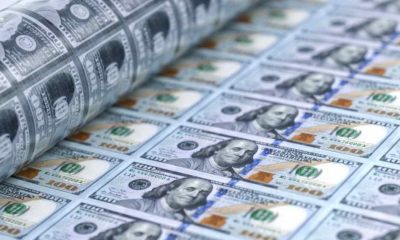Business
Are Ultra Low Interest Rates Here To Stay?

Central bank bond buying is one of the reasons the latest U.S. Treasury yields were reported with such a steep decline.
This sharp drop shows the cost of two deciding factors that have shaped the lead up to this occurrence:
- The cost of the country’s economic selections over the years
- The result of political choices made over time.
The chart below tells its interesting story of the incredible highs and lows the U.S. Treasury yields have displayed for decades.
And the steepest possible decline has recently been reached.
The predictions for any increase shortly look slim to none.
If it were to go any lower, it would disappear under the baseline.

So it is safe to say that the all-time low-interest rates are here for a protracted period.
As previously mentioned, the nearest reason for the plunge is central-bank bond buying.
Treasury notes are always seen as a particularly safe asset, but they usually fall in price when risk sentiment rises.
As the ripples of unquiet calmed over Britain’s shock Brexit vote, European stocks and following on, U.S. equity futures, rose.
This caused a decline in Treasury notes.
Not enough to show a marked return to normalcy, though.
Viewing the chart below, the link to S & P 500 dividend yields and Treasury yields show a mirror pattern.
This link in yields continues today.

Central bankers are not to be the ones solely singled out for the all-time low of 1.366% that was reported.
The plummeting rates represent the steady increase and ultimate cost of two factors:
- Hyper dependence on debt-financed growth
- Gradually increasing regulations
These culprits listed above, are the primary drivers of the crashing interest rates.
Indications of these being the key reasons are in evidence just under the surface gloss of the record bond prices and stocks showing on current charts.
Borrowing, especially for companies, has been happening at great rapidity, propelled by the lower than low-interest rates.
But capital investment is in the doldrums and share buybacks are widespread.
This is an unwelcome throwback to the financial practices that were supposed to have been refuted.
[ms_divider style=”normal” align=”left” width=”100%” margin_top=”30″ margin_bottom=”30″ border_size=”5″ border_color=”#f2f2f2″ icon=”” class=”” id=””][/ms_divider]
[ms_featurebox style=”4″ title_font_size=”18″ title_color=”#2b2b2b” icon_circle=”no” icon_size=”46″ title=”Recommended Link” icon=”” alignment=”left” icon_animation_type=”” icon_color=”” icon_background_color=”” icon_border_color=”” icon_border_width=”0″ flip_icon=”none” spinning_icon=”no” icon_image=”” icon_image_width=”0″ icon_image_height=”” link_url=”https://offers.thecapitalist.com/p/58-billion-stock-steal/index” link_target=”_blank” link_text=”Click Here To Find Out What It Is…” link_color=”#4885bf” content_color=”” content_box_background_color=”” class=”” id=””]This one stock is quietly earning 100s of percent in the gold bull market. It's already up 294% [/ms_featurebox]
[ms_divider style=”normal” align=”left” width=”100%” margin_top=”30″ margin_bottom=”30″ border_size=”5″ border_color=”#f2f2f2″ icon=”” class=”” id=””][/ms_divider]
U.S. banks were to have been forever shored up by the Dodd-Frank do-over, even though it led to tighter credit regulations that held back recovery.
The business formation has declined in the last few years which caused job growth to lessen.
The economy, according to analysts, may seem more stable and unexciting, but this may not necessarily be a good thing.
Exacerbating the problem is the ever encroaching debt accumulation.
When the financial collapse occurred, it was meant to be a warning and an era of deleveraging should have led to a more balanced world economy.
The warning seems not to have had much resonance, as global debts are now higher than they were in 2007.

The increase in debt has been most marked in developing countries with higher aspirational lifestyles, like China.
Grave concerns continue to be voiced over the value of the Chinese yuan as the doubtful transparency of that country’s government.
Even though considerable deleveraging has occurred in U.S. both banking and household sectors, total debt has still risen to hit 251% of GDP in 2015 an increase from the 228% level in 2007.
With such easy access to continual borrowing on credit, the U.S. is mortgaging its future profits up to the hilt.
U.S. economic performance will falter as a result.
Even when adjusted for inflation, the U.S. median income per household has fallen 7%, and the use of food stamps has nearly doubled to over 43 million people.
In this climate of economic and political fluctuation, low-volatility stock portfolios display steadfast gains as Wall Street holds on to its sentiment of risk aversion and slow growth.
Trades are becoming crowded, and returns are low, showing that caution is a by-word in the markets.
In the wake of the tech bubble in 1999 at least high-value tech companies survived the highs and lows.
When buying into to desirable minimum-volatility (mini volts) portfolios now, however, it inflates the price in the search a safe bet, and this masks the markets ability to read an actual winning stock.
This has formed a potential minivolt bubble.















